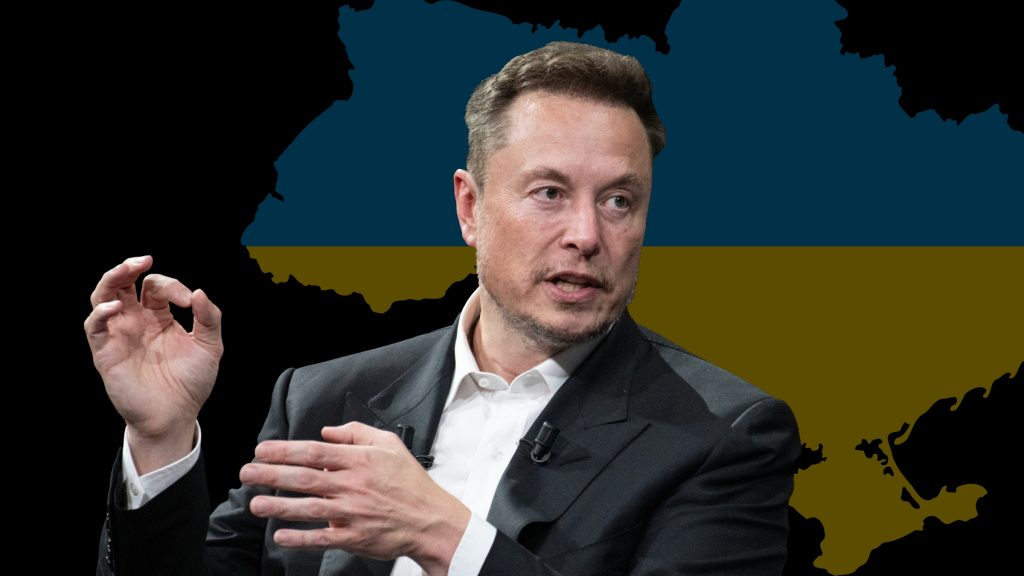
On the Ukraine-Russia stage, Elon Musk found himself at a crossroad with SpaceX’s Starlink internet service as he considered stopping Ukraine’s internet access following a ‘great conversation with Putin.’
The South African entrepreneur contemplated this action following a meeting with the Russian President Vladimir Putin. The reason? Well, we don’t know for sure. One former Pentagon official stated that it could be out of fear of being perceived as a warmonger in Russia.
Was it really? Again, we don’t know.
According to sources, the billionaire’s worry proliferated after Ukrainian military networks faced a wave of paralyzing outages near the front lines standing between them and their Russian counterparts.
For Ukraine, Starlink plays a vital role in the country’s military successes throughout the war that started February 22, 2022. The satellite constellation outages reverberated most intensely in key Ukrainian regions, including Kherson, Zaporizhzhia, Luhansk, and Donetsk. These territories had been the subject of Kremlin-backed referendums that ultimately claimed them as part of Russia. In this war-mongered play, the Starlink satellite terminals, provided by SpaceX in collaboration with the US government and private donors, became integral to Ukraine’s military communications.
One key player in the high stakes uncovering emerged as a key player in this uncovering of events, former US undersecretary of defense for policy, Colin Kahl.
Kahl, who was responsible for mediating a resolution, recalled his conversation with the Tesla CEO in a recent interview with The New Yorker. At the time, and in an attempt to highlight the significant ramifications of the decision, Kohl told Musk that if he was to “turn this off, it doesn’t end the war.”
Kahl’s inference on this whole situation was that Musk “was getting nervous that Starlink’s involvement was increasingly seen in Russia as enabling the Ukrainian war effort and was looking for a way to placate Russian concerns.”
In my Musk’s mind, Starlink’s role was more and more perceived by Russia as taking side in the Russian-Ukraine war. To Russia, Musk was aiding the Ukrainian war efforts, which eventually would label him a geopolitical player aiding the Ukrainian war efforts.
In addition, Musk’s concerns transformed into something bigger following the allegations that the 52-year old CEO presented a peace proposal that was leaning more towards the Kremlin’s interest, rather than those of Ukraine.
The proposal, which suggested that Ukraine should mirror its counterpart’s sovereignty referendums in occupied regions, sparked political and public controversy and criticism against Musk.
Throughout the war, Starlink’s constellation of network satellites played a critical role in Ukraine’s war efforts, such as the facilitation of drone and artillery coordination, live battle streaming, and intelligence gathering. As a matter of fact, Elon Musk once publicized that, due to his SpaceX’s accessibility of Starlink’s digital map, he witnessed the unfolding of the conflict right before his eyes. This access to the war’s live footage led Musk to ponder on his – and his company’s – moral role, and whether he was enabling peace or further fueling the conflict.
And if we are to mull over on past incidents, we will find that this isn’t Musk’s first moral contemplation with ethical concerns. The multi-billion-dollar CEO has always publicized his reservations about his technology being harness for destructive purposes.
As for the financial implications, Musk can be seen as a winner in this scenario. Providing the Starlink system reportedly costs an estimated, whopping, $400 million for a year. Yes, you can say this can be perceived as a lucrative expenditure. Amid the back-and-forth wave of negotiations, the Pentagon announced a breakthrough in June where a deal with SpaceX to sustain Starlink’s usage in Ukraine was uncovered.
Yet, the nitty-gritty details of this accord remain secret.
Inside Telecom provides you with an extensive list of content covering all aspects of the tech industry. Keep an eye on our Ethical Tech section to stay informed and up-to-date with our daily articles.